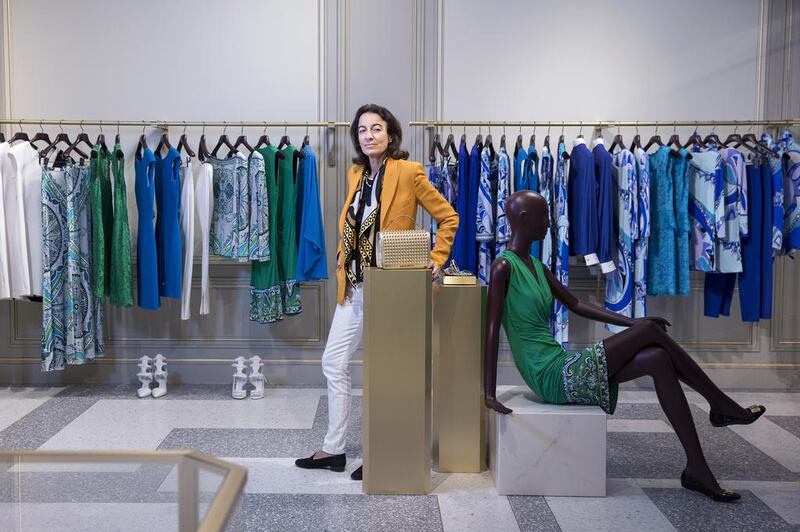When I first meet the affable Laudomia Pucci di Barsento at The Galleria’s Emilio Pucci store, she asks me to take a seat right next to her. She talks me through the brand’s history, casually flicking through pages of the recent Pucci coffee-table book, a collaboration between the Italian label and the German publisher Benedikt Taschen.
As the daughter of Emilio Pucci, Laudomia is the ideal storyteller for the brand. Her father, who founded his label in the late 1940s, took his first steps into fashion by chance, when a photograph of a ski suit he designed for his female friend landed in Harper’s Bazaar.
Laudomia was brought up in an architecturally stunning, aristocratic household: the Palazzo Pucci in Florence. Not only does the Pucci family continue to reside there, but the home still serves as a base for the business – both physically and inspirationally.
In fact, the design of the Abu Dhabi Emilio Pucci store (among 55 others around the world) is based on the interiors of the Palazzo. Laudomia frantically flips through the Pucci book to show me exactly where the inspiration came from. “We’ve incorporated the greys and golds from the walls and doors,” she says. “The burgundy Breccia dei Medici marble from the door frames is used here in the coffee table and that shade has been added into the carpet and sofa,” she adds, pointing to the very sofa we’re sitting on.
Joseph Dirand was the architect behind the label’s new store. He took inspiration not only from the Palazzo, but also from Emilio Pucci’s actual prints and incorporated the 1966 Torre print onto the crushed marble floor to create abstract, maze-like designs.
The Palazzo is so entwined into the Pucci dynasty that Peter Dundas, the brand’s artistic director who is known for revamping the label, has based his studio there. Asked how things have changed since bringing Dundas on board, Laudomia says: “Peter gave the collections a young feel – you can call it hip-hop or rock and roll.”
It’s instantly clear that Laudomia is the kind of woman who embraces change. Before working at Pucci, she was pursuing a career in politics. But when her father requested that she help him run the family business, she joined the fashion team and a few years later became chief executive. Did she not have any siblings who could have helped instead? “Not anymore,” she says abruptly – her smile vanishing, if only for a moment. “But let’s not talk about that.”
In 2000, Laudomia’s life faced another big transformation: 67 per cent of the Emilio Pucci label was purchased by the French conglomerate LVMH. Her new title became deputy chairman and image director. “Everything has changed from when I first began,” she says.
“The digital revolution has transformed the way we create and communicate. New markets have opened up, from Russia to China to the Middle East.”
One thing that remains consistent throughout Pucci’s history is the brand’s iconic prints. The kaleidoscopic graphic visuals, which were made famous by Lauren Bacall and Elizabeth Taylor, remain an important part of Pucci’s DNA.
“Peter has been very creative in mixing new ways of interpreting the classic Pucci prints, mostly with lace and in a very innovative way,” says Laudomia, referring to Dundas’s blending of Pucci’s archived psychedelic prints into unusual fabrics. However, instead of the brand’s traditional combination of print and colour, Dundas weaves the designs with texture: sequins, beading, chiffon and leather.
For Laudomia though, Pucci isn’t just about clothes. The history of the label carries is visible in the collections and the emotional connection she has with the company is ever present. “It has actually always been that way, but this doesn’t mean it is difficult,” she says. “It just means you have more passion for your job.”
Laudomia’s dream is that Pucci stays within the family and she hopes that her daughter takes over the reins one day – only if she wants to, of course.
neldasher@thenational.ae





